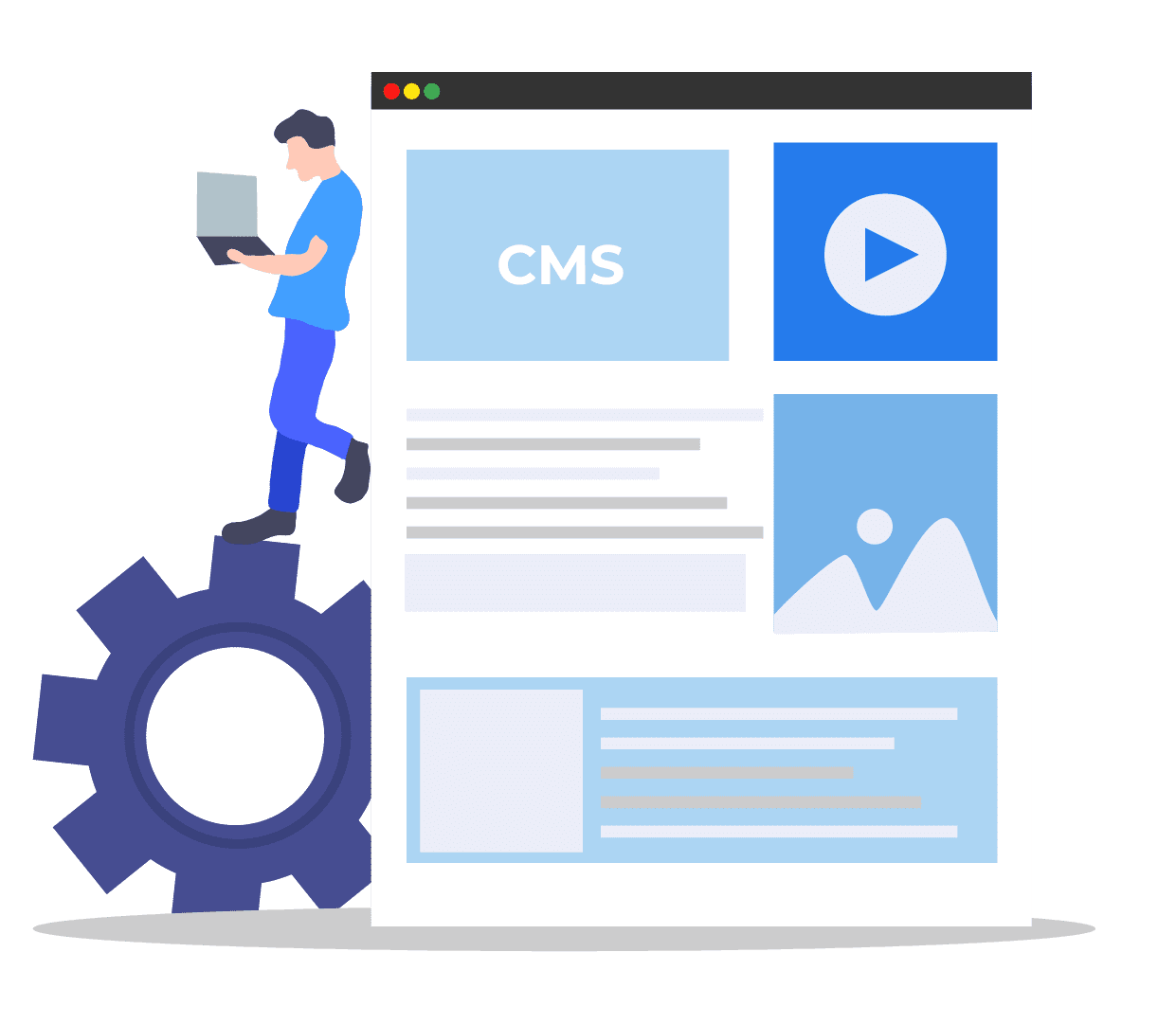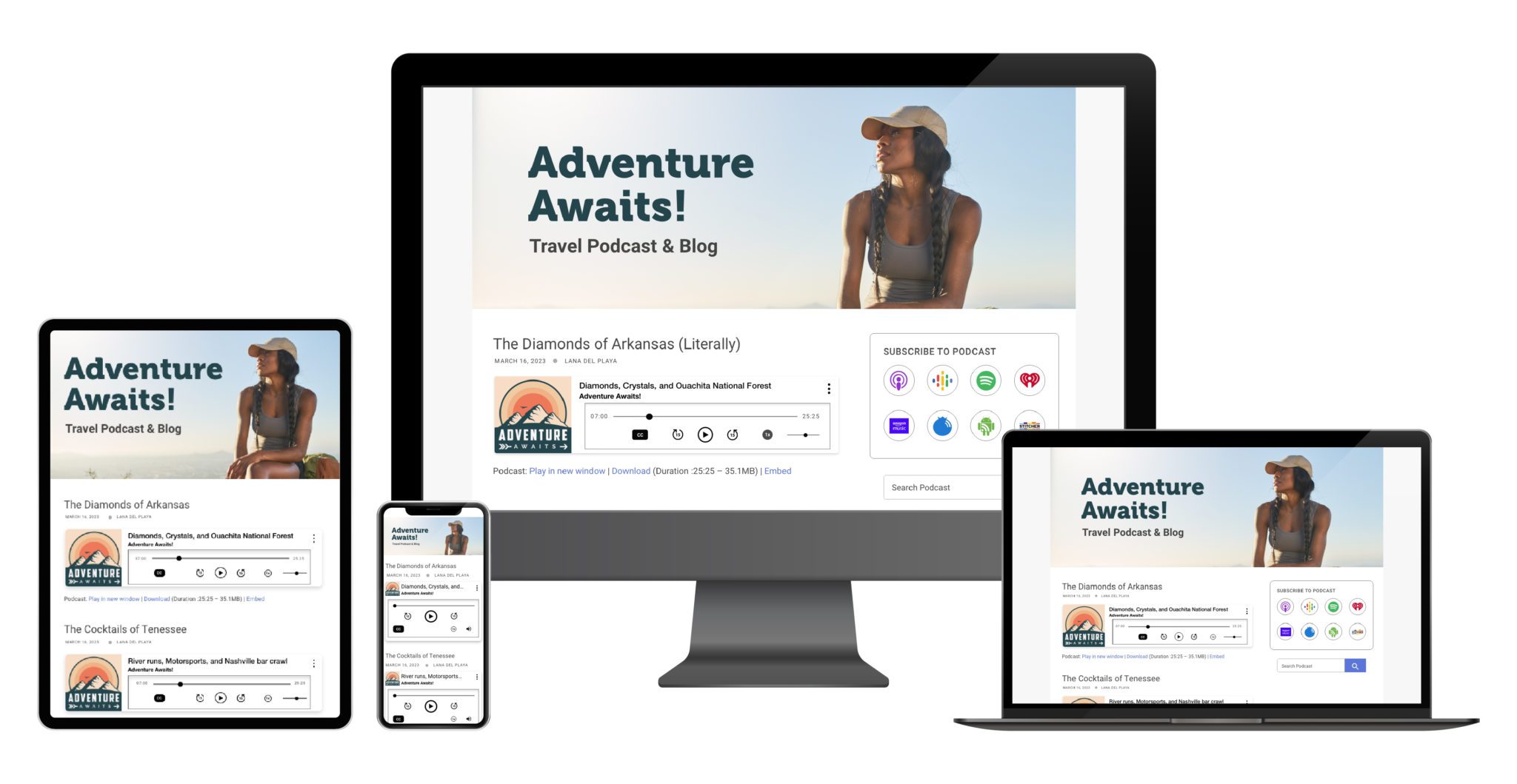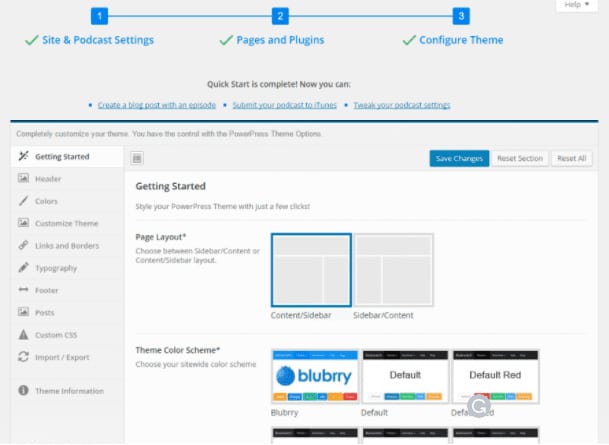Free WordPress Site
Included with all podcast hosting plans
WordPress Site included with Podcast Hosting!
Establish Your Podcast’s Online Presence
A crucial element in building your podcast’s brand is having a dedicated website on your domain. Blubrry provides all hosting customers with a free managed WordPress website to host your podcast on your website, reinforcing the podcasting 101 principles of owning your digital real estate.
Your podcast website is the go-to destination for your audience to discover the latest episodes and learn more about your show. A professional-looking website enhances your podcast’s brand image and credibility.
No Experience Necessary
You don’t have to be familiar with designing or maintaining a website to utilize our free WordPress sites. Blubrry makes it easy for you to create and publish your podcast episodes on your own WordPress site.
Apply your branding and select your color scheme to podcast-optimized templates. We handle the backend responsibilities, such as backing it up daily, hosting your website, updating plugins, managing security, and ensuring functions run smoothly

The Complete Podcast Package
Everything you’ll need to easily create a podcast site
Podcast Hosting
-
Publish and distribute your podcast to all major platforms and players
-
Free migration and tech support
-
Standard Statistics with hosting
-
Blubrry Audio Player

PowerPress Plugin
-
Control your brand and build home for your podcast
-
The most trusted podcast plugin since 2008
-
Free to all podcasters
-
Publish in minutes

PODCAST STATISTICS
-
Watch your listeners grow through podcast analytics!
-
With Blubrry, you know your numbers are accurate
-
Where are your listeners located?
-
What platforms are they using?

Standard
The Standard plan allows users to create a branded, mobile-ready podcast website where you can blog with a podcast-optimized theme and use essential plugins, all with our quick start tools. The introduction of widgets and embeds for all hosting plans transforms your podcast website into an interactive hub for your audience.
Advanced
An Advanced site is for podcasters who want to map their own domain and those wanting enhanced Search Engine Optimization / Discovery with an SSL certificate. It includes popular plugins, access to our widgets and embeds, multiple site templates, and a variety of themes to choose from.
Plan Breakdowns
Quick and Easy Setup
Built on 19 years of experience in podcasting, Blubrry’s technologies have been refined to deliver a well-rounded online listener and podcaster experience. Whether you are starting your podcast or migrating from a different company with hundreds of episodes, our service combinations provide a customized fit for any podcaster.
How to Set Up Your Site
Podcast Support

Frequently Asked Questions
What is a website template?
A customizable podcast website serves as a centralized hub for a podcaster’s content, offering a platform where listeners can access episodes, learn more about the show and its creators, and engage with supplementary materials like episode transcripts, guest bios, and exclusive content.
It plays a crucial role in establishing and reinforcing the podcaster’s brand, providing a unique space to showcase their distinct voice, theme, and values distinct from crowded podcast directories. Beyond mere distribution, a dedicated website enhances discoverability through SEO, facilitates direct listener engagement via comments or newsletters, and opens avenues for monetization through merchandise sales, sponsorships, and listener donations. In essence, a podcast website amplifies the reach and impact of a podcast. It strengthens the connection between creators and their audience, laying a foundational-pillar for long-term growth and success in the digital content landscape.
How can a website help with my podcast's discoverability?
A well-optimized website can improve your podcast’s visibility in search engine results, making it easier for potential listeners to find your content. For instance:
- Improved Search Engine Rankings: A website optimized for SEO (Search Engine Optimization) helps your podcast rank higher in search results by using relevant keywords, meta tags, and descriptions that match what potential listeners are searching for.
- Enhanced Discoverability: With properly structured content, including transcripts, show notes, and relevant blog posts, your website provides more entry points for search engines to index, making it easier for new listeners to discover your podcast.
- Authority Building: Regularly updated content on your website, such as episode recaps or blogs, signals to search engines that your site is active and authoritative, which can improve your podcast’s ranking and visibility.
- Better User Experience: An optimized website enhances user experience with faster load times, mobile responsiveness, and easy navigation, factors that search engines consider when ranking pages, thereby boosting your podcast’s discoverability.
- Increased Backlink Opportunities: A well-optimized website encourages other sites to link back to your content, increasing your domain authority and improving your podcast’s chances of appearing in top search engine results.
What is a website theme?
A podcast theme refers to the overarching subject matter or concept that unifies the podcast’s episodes, providing a consistent framework for content creation. It serves as a guiding beacon for both the creators and the audience, dictating the tone, style, and direction of the podcast.
The importance of a well-defined theme cannot be overstated—it not only helps in attracting a targeted audience with specific interests but also aids in building a loyal community of listeners who resonate with the podcast’s content. By establishing a clear theme, podcasters can streamline their content production process, ensure coherence across episodes, and differentiate their show in a crowded marketplace. Furthermore, a compelling theme enhances the podcast’s branding efforts, making it more memorable and recognizable to listeners and potential sponsors alike. In essence, the theme is vital for maintaining relevance, engagement, and consistency, laying the foundation for a podcast’s identity and success.
Can't I just use social media and podcast platforms for promotion?
While social media and podcast platforms are essential for promotion, a website offers a branded space that you control, providing more flexibility in content presentation and monetization.
- Complete Ownership and Control: Unlike social media and podcast platforms, your website is entirely yours, allowing you to control the design, content, and user experience without restrictions or changes imposed by third-party platforms.
- Flexible Content Presentation: A website offers the freedom to present your content in various formats—blogs, videos, transcripts, and interactive elements—tailored to engage your audience more effectively and support your branding.
- Enhanced Monetization Options: With a website, you can implement diverse monetization strategies, such as affiliate marketing, direct sponsorships, merchandise sales, and premium content, without sharing revenue with external platforms.
- Stronger Audience Engagement: Your website allows you to build a direct relationship with your audience through email newsletters, gated content, or community forums, increasing listener loyalty and engagement beyond the limitations of social media algorithms.
- Consistent Branding: A dedicated website provides a cohesive space where your branding elements—colors, logos, tone, and style—are consistently applied, reinforcing your podcast’s identity and making a stronger impression on your audience.
What should I include on my podcast website?
Here’s a list of key elements podcasters should include on their podcast’s website:
- Homepage with Podcast Overview: A welcoming page that includes a brief description of your podcast, the latest episodes, and an engaging call to action for visitors to listen, subscribe, or join your community.
- Episode Archive: A searchable and organized list of all episodes with show notes, episode descriptions, and embedded audio or video players, making it easy for visitors to find and play specific episodes.
- About Page: Information about the host(s), the podcast’s story, mission, and purpose, helping visitors connect with the people behind the podcast and understand the value of the content.
- Subscription Links: Prominent buttons and links to major podcast directories (like Apple Podcasts, Spotify, Google Podcasts) to make it easy for listeners to subscribe on their preferred platform.
- Contact Information and Social Media Links: A contact form or email address for listener feedback, guest inquiries, or sponsorship opportunities, along with links to your social media profiles to encourage engagement.
- Transcripts and Show Notes: Detailed show notes, including episode highlights, guest bios, resources mentioned, and full transcripts to improve SEO and provide accessibility for all users.
- Newsletter Signup: An email signup form to build a mailing list for direct communication with listeners, providing updates, exclusive content, or special offers.
- Monetization Opportunities: Dedicated sections for sponsorship details, merchandise stores, donation links (like Value4Value, Patreon or Buy Me a Coffee), or premium content subscriptions.
- SEO Optimization Elements: Meta descriptions, relevant keywords, alt tags for images, and fast loading times to enhance visibility in search engine results.
- Testimonials and Reviews: Listener testimonials, reviews, or ratings that add social proof and encourage new visitors to trust and listen to your podcast.
- Event and Appearance Updates: A calendar or section for upcoming live shows, guest appearances, or events where fans can meet or engage with you in real time.
- Press Kit and Media Resources: A downloadable press kit with your bio, high-resolution images, logos, and promotional materials for media inquiries or potential collaborations.
These elements ensure your podcast’s website is a comprehensive and engaging hub for listeners, offering multiple ways to interact with your content and brand.
Is it difficult to set up and maintain a podcast website?
With platforms like WordPress, setting up a website has become more accessible. These platforms offer podcast-specific themes and tools that simplify website management. WordPress offers Blubrry Podcasting’s PowerPress plugin, which is easy to install and allows users to podcast from their site. Plus, Blubrry hosting customers have the advantage of the support team, available during business hours ET.
How does a website facilitate listener engagement?
A website allows for direct listener interaction through comments, feedback forms, and newsletter sign-ups, fostering a stronger community around your podcast.
Here are five examples of how a podcast’s website helps build engagement with audiences:
- Interactive Content: Features like comment sections, discussion forums, or polls on episode pages encourage listeners to share their thoughts, ask questions, and interact directly with the host and other listeners, fostering a sense of community around the podcast.
- Exclusive Access: Offering bonus content, early access to episodes, behind-the-scenes updates, or special offers through a members-only area or email newsletter creates a sense of exclusivity and rewards loyal listeners, driving deeper engagement. These are made easy through Blubrry’s Premium Podcasting and Private Podcasting.
- Personalized Communication: A website allows for direct communication with your audience through contact forms or personalized email newsletters, making listeners feel valued and more connected to the podcast.
- Live Events and Announcements: Promoting live streams, virtual meetups, Q&A sessions, or other interactive events directly on your website gives listeners opportunities to engage in real time, enhancing their connection with the podcast.
- Content Sharing and Social Proof: Providing easy-to-use social sharing buttons, testimonials, or listener-submitted content encourages listeners to share episodes, participate in community challenges, or contribute stories, expanding reach and engagement.
These strategies help transform your website into an active hub for audience interaction, boosting listener loyalty and engagement.
Who actually owns my website?
Owning your podcast’s brand and maintaining control over it, regardless of the hosting platform, is crucial for ensuring creative freedom, fostering audience loyalty, and securing the long-term viability and profitability of your content. If a Blubrry WordPress website user chooses to leave Blubrry, they can export their site data and settings (URL included) with them and do with their domain as they please. Advanced plan users can map their own domain.








